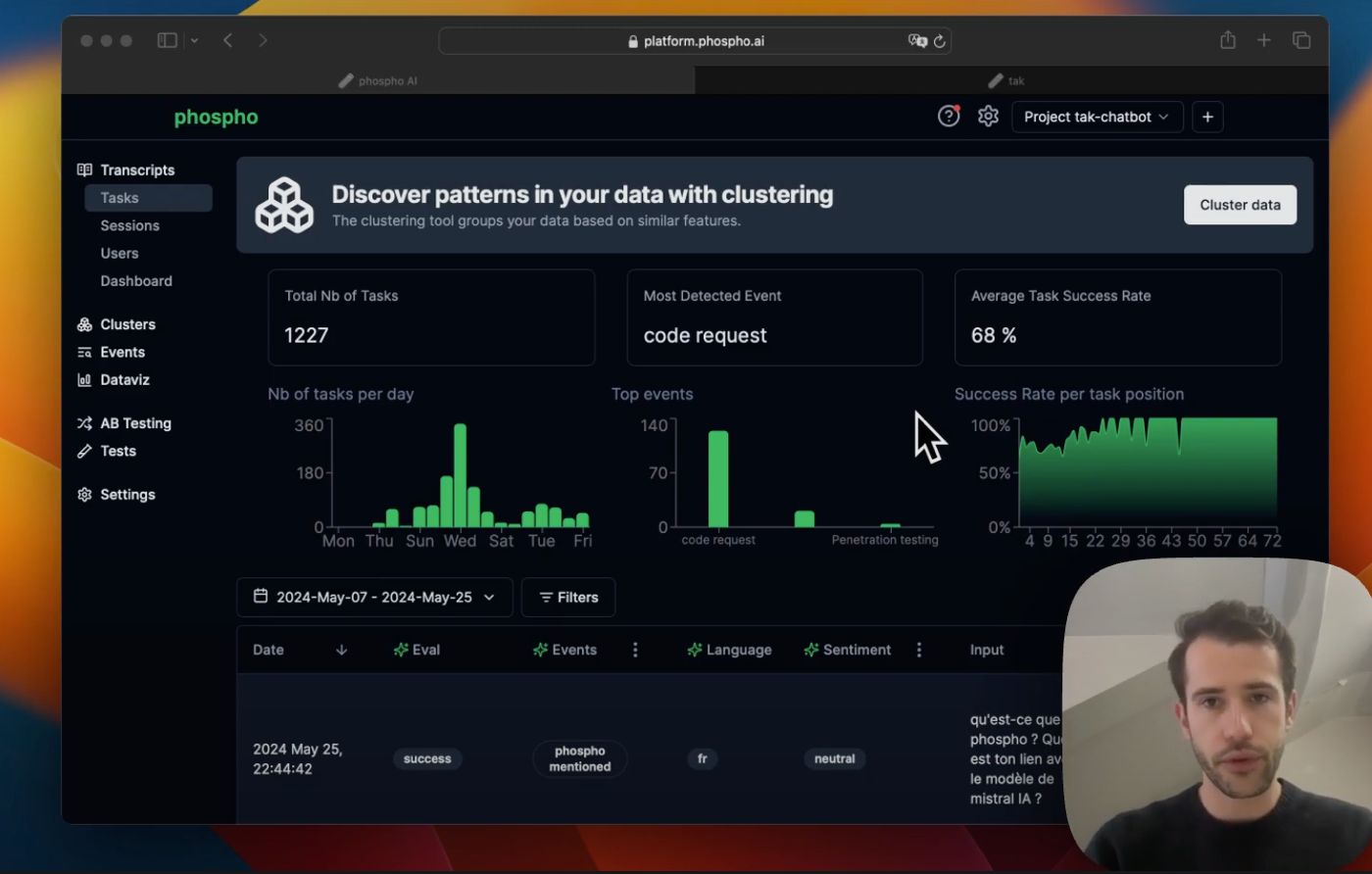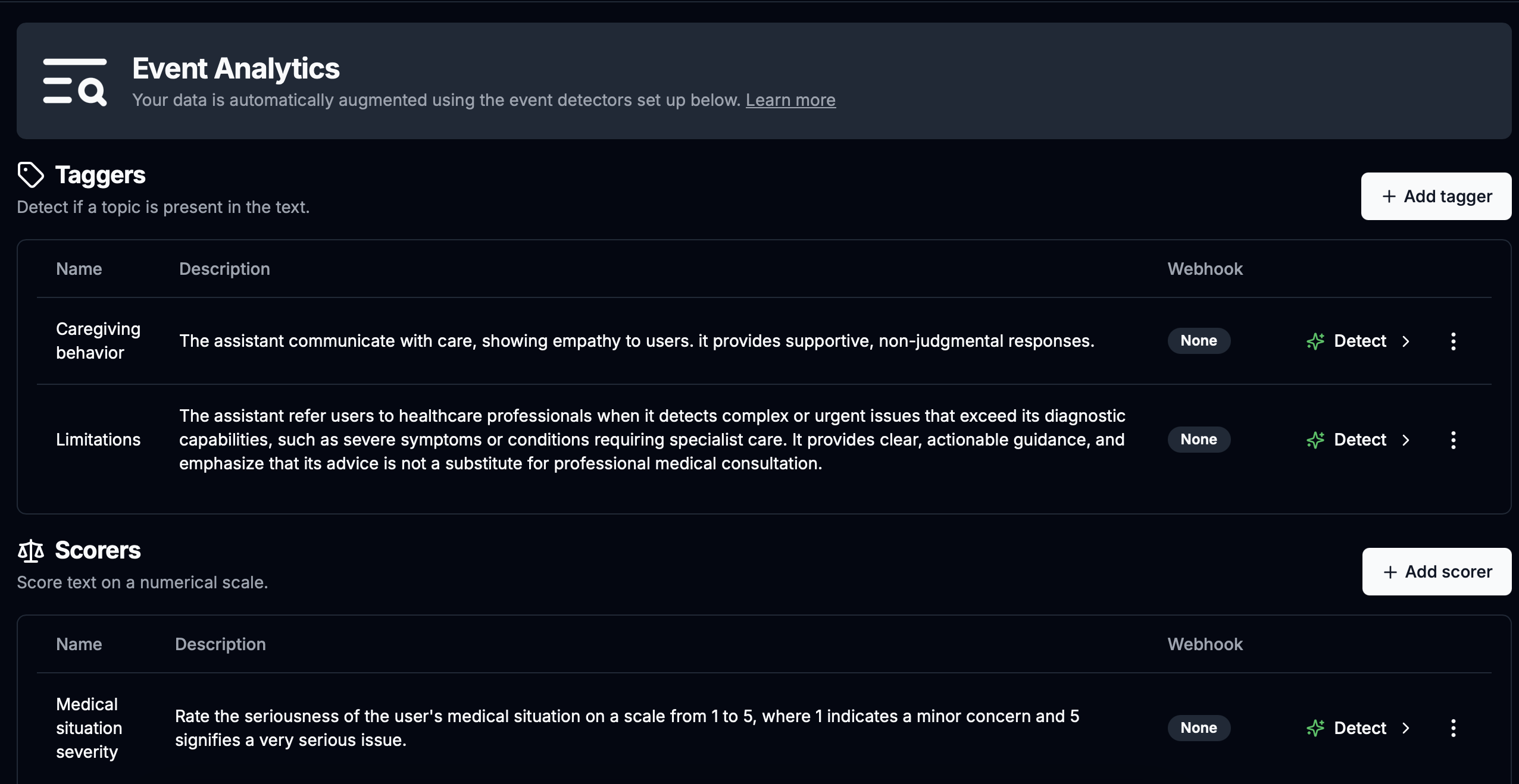What is Personal Grounding for LLMs?
Personal grounding for LLMs involves customizing model responses based on user-specific data, making AI outputs more accurate. Phospho's platform supports grounding for effective product optimization and user satisfaction.

Exciting news, phospho is now bringing brains to robots!
With phosphobot, you can control robots, collect data, fine-tune robotics AI models, and deploy them in real-time.
Check it out here: robots.phospho.ai.
What is personal grounding for LLMs, and why is it important?
Large Language Models (LLMs) like ChatGPT and other AI search engines are becoming more popular by the day – with each one seeming more advanced in its ability to understand and respond to human queries.
These models do have their challenges when used in the real world, though, especially in business contexts, or in very niche industries.
LLMs need “grounding” because while they are trained to have a broad understanding of language and logic, they are still reasoning engines, meaning they lack contextual and domain-specific understanding. Answers aren’t always precise or correct, and sometimes they just aren’t contextually relevant, leading to frustration, inaccurate data and time lost for users.
Grounding helps LLMs to better understand and connect with users in the real world. The process of grounding also helps to prevent hallucinations – which is where wrong data is presented confidently and convincingly even though it’s inaccurate.
Grounding an LLM will help the model to understand the meaning and context behind words and better navigate the nuances of human language to better help users in the real world.
However, there is a difference between “general grounding” and “personal grounding”. In this article, we’ll explore the two types of grounding processes for LLMs and present Phospho, our text analytics platform, that can help you ground your AI model.
How Does General Grounding Work?
Grounding is the process of anchoring or linking language model outputs to reliable and accurate information.
The process is important as it makes sure LLMs like search engines provide factual, relevant and appropriate information. This is essential in every case, but you can see how it might be particularly crucial in professional or high stakes cases, such as journalism, data science or healthcare.
Standard LLMs are fairly limited, as any casual ChatGPT user will tell you. They rely completely on trained knowledge and lack real-time contextual updates, so information might be wrong, out of date or not relevant to the user’s query. Ungrounded LMMs are also more prone to errors and hallucinations, throwing up wrong information or misunderstanding the question.
The focus of grounding is to tailor model responses to your users, making sure they only receive the most accurate and relevant information.
Grounding improves LLM performance in the following ways:
Makes Responses More Relevant and Accurate
The process of grounding makes responses more accurate because the LLM taps into external data sources – such as business documents or databases – to find the best answers to user questions.
No More Hallucinations or Errors
By connecting the model to real-time data, grounding reduces the risk of hallucinations and incorrect responses, resulting in more accurate responses.
Supports RAG
Grounded LLM models often use Retrieval-Automated Generation (RAG) when they pull information from external documents and databases. This process makes responses much more reliable as they are based on verified and up-to-date information from reputable, approved sources.
Personalized User Experiences
It’s clear from the benefits we’ve already described that grounding allows LLMs to deliver much more personalized user experiences. Responses will not only be more accurate but they’ll also be closer aligned to users’ past interactions and preferences, resulting in much more conversational, user-friendly search.
General and Personal Grounding for Product Optimization
You might be wondering, what is personal grounding for LLMs and when is it used?
Personal grounding refers to the process of customizing an LLM response based on specific user or organizational data.
The main difference is that personal grounding incorporates user-specific contexts and data, while general grounding relies on publicly available, more general information.
When Is Grounding Used for LLMs?
All LLMs should be grounded to some extent, but personal grounding may be required in niche industries or specific business contexts.
For example, in industries like finance and healthcare where data precision is crucial, LLMs should be grounded using department or business data documents and relevant databases to make sure results are relevant and accurate.
Similarly, an LLM that’s used for a customer support chatbot can be grounded using company FAQ documents and data so it delivers specific answers to user questions, rather than more generalized information that may not be helpful.
An educational app may also use a personal grounding system to generate answers based on the curriculum or a particular set of textbooks, while tech companies could train their LLMs according to product information or technical documentation.
Although personal grounding is important, it does come with some inherent challenges. For one, it can be difficult and time-consuming to integrate real-time, highly specific data into LLMs, but there are also concerns about data privacy, especially when it comes to sensitive information, such as healthcare records.
Text Analytics, Grounding and LLMs: What’s the Connection?
Text analytics is relevant to grounding and personal grounding in a few different ways.
The term refers to the process of extracting data insights and structured information from an unstructured text source.
Text analytics allows businesses to analyze user interactions and common issues and use this feedback to update and improve their LLM. It’s an important function for iterative training, as it helps feed models with up-to-date information, making responses more accurate and timely.
LLMS need to be able to identify edge cases and anomalies so they can quickly improve, which text analytics can help with. Companies can also define their own metrics and KPIs to better monitor user satisfaction and work on model improvements.
Phospho: The Text Analytics Platform

Phospho is an open-source text analytics tool that helps LLM applications by providing real-time insights, evaluation and improvement.
With Phospho, you can easily compare grounded and ungrounded versions of your LLM responses to identify the amount of grounding needed to keep your users happy and well-informed.
You can also use our real-time monitoring and evaluation tools to observe how your LLMs are being used, making sure any issues are quickly identified and fixed.
Why Use Phospho to Ground LLMs?
User Satisfaction
Phospho helps companies to align their LLMs with user expectations for product optimization, making sure responses are relevant and accurate. This leads to higher levels of customer satisfaction and better feedback, helping you find product-market fit faster and resulting in a superior AI product.
Lower Costs
Our tool is much more cost-effective than others on the market. Plus, our continuous monitoring features and feedback loops will help you save valuable resources by negating the need for manual model evaluation and constant troubleshooting.
Accurate and Reliable
Phospho will improve the accuracy and reliability of your LLM responses by helping you refine the grounding process and quickly fix user issues and errors.
Fast Model Improvement
Our platform streamlines the process of updating and retraining your models, cutting out manual processing time and shortening the iteration cycle. You’ll be able to quickly align your model with the needs of your target market and find market fit.
Compliant and Secure
Phospho can be configured to support specific data privacy needs throughout the personal grounding process, so you can stay compliant with data protection regulations and keep user data safe.
Want to take AI to the next level?
At Phospho, we give brains to robots. We let you power any robot with advanced AI – control, collect data, fine-tune, and deploy seamlessly.
New to robotics? Start with our dev kit.
👉 Explore at robots.phospho.ai.
